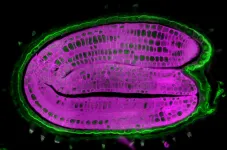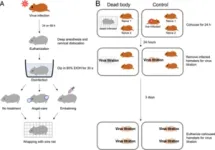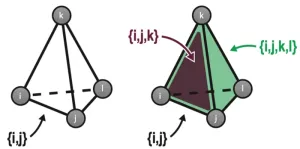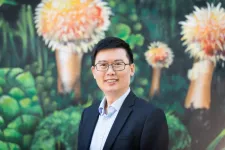(Press-News.org) Germination is a crucial stage in the life of a plant as it will leave the stage of seed resistant to various environmental constraints (climatic conditions, absence of nutritive elements, etc.) to become a seedling much more vulnerable. The survival of the young plant depends on the timing of this transition. It is therefore essential that this stage be finely controlled. A Swiss team, led by scientists from the University of Geneva (UNIGE), has discovered the internal thermometer of seeds that can delay or even block germination if temperatures are too high for the future seedling. This work could help optimize plant growth in a context of global warming. These results can be read in the journal Nature Communications.
Newly formed seeds are dormant: they are unable to germinate. After a few days (or even months, depending on the species), the seeds awaken and acquire the ability to germinate during the favorable season for seedling growth and new seed production. However, non-dormant seeds can still decide their fate. For example, a non-dormant seed that is suddenly subjected to excessively high temperatures (>28°C) can block germination. This mechanism of repression by temperature (thermo-inhibition) allows a very fine regulation. A variation of only 1 to 2°C can indeed delay the germination of a seed population and thus increase the chances of survival of future seedlings.
A key protein: phytochrome B
The group of Luis Lopez-Molina, professor at the Department of Plant Sciences of the Faculty of Science of the UNIGE, is interested in the control of germination in Arabidopsis thaliana, a plant species belonging to the Brassicaceae family and used as a model in many research projects. To understand the detection mechanisms that allow seeds to trigger thermo-inhibition, scientists explored the track of phenomena already described and quite similar in young plants, i.e. at a more advanced stage of development.
Indeed, temperature changes are also perceived by seedlings, in which a slight increase in temperature promotes stem growth. This adaptation is similar to the one observed when a plant finds itself in the shadow of another: it lengthens to escape the shadow in order to expose itself to the sunlight which is more favorable for photosynthesis. These variations are detected by a protein sensitive to light and temperature, phytochrome B, which normally acts as a brake on plant growth. An increase of 1 to 2°C promotes the inactivation of phytochrome B, which makes it less effective in preventing growth.
An internal thermometer
To understand whether phytochrome B also plays a role in thermo-inhibition during germination, the authors dissected the seeds to separate the two tissues inside the seed: the embryo (which will give the young plant) and the endosperm (nourishing tissue that also controls germination in Arabidopsis seed). Unlike embryos grown in contact with the endosperm, the researchers found that embryos deprived of their endosperm are unable to stop their growth under too high temperatures, which leads to their death.
‘‘We found that thermo-inhibition in Arabidopsis is not autonomously controlled by the embryo but implemented by the endosperm, revealing a new essential function for this tissue,’’ explains Urszula Piskurewicz, researcher at the Department of Plant Sciences of the UNIGE Faculty of Science and first author of the study. ‘‘In other words, in the absence of endosperm, the embryo within the seed would not perceive that the temperatures are too high and would begin its germination, which would be fatal’’.
Optimizing crop germination
Thermal inhibition of germination is a new example of the influence of climatic variations on certain cyclic phenomena in plant life (germination, flowering, etc.). ‘‘This trait is expected to have an impact on species distribution and plant agriculture and this impact will be greater as temperatures increase worldwide,’’ reports Luis Lopez-Molina, the study’s last author. A better understanding of how light and temperature trigger or delay seed germination could indeed help optimize the growth of plants exposed to a wide range of climatic conditions.
END
An internal thermometer tells the seeds when to germinate
A UNIGE team has discovered the mechanisms by which the seed decides to remain in «hibernation» or to trigger its germination depending on the outside temperature.
2023-03-07
ELSE PRESS RELEASES FROM THIS DATE:
Study reveals limitations in evaluating gene editing technology in human embryos
2023-03-07
A commonly used scientific method to analyze a tiny amount of DNA in early human embryos fails to accurately reflect gene edits, according to new research led by scientists at Oregon Health & Science University.
The study, published today in the journal Nature Communications, involved sequencing the genomes of early human embryos that had undergone genome editing using the gene-editing tool CRISPR. The work calls into question the accuracy of a DNA-reading procedure that relies on amplifying a small amount of DNA for purposes of genetic testing.
In addition, the study reveals that gene editing to correct disease-causing mutations in early human embryos can also lead to unintended ...
Keck Medicine of USC names Ikenna (Ike) Mmeje president and CEO of USC Arcadia Hospital
2023-03-07
LOS ANGELES — Keck Medicine of USC has named Ikenna (Ike) Mmeje president and CEO of USC Arcadia Hospital (USC-AH), effective March 13.
In this position, Mmeje will further the health system’s mission to expand access to specialized health care and research to the San Gabriel Valley and beyond. He will oversee all management and operations of the hospital, including corporate compliance, strategic plan implementation and fundraising.
“Mmeje will utilize his wealth of knowledge and experience running complex, high-performing hospitals in his new role leading USC Arcadia Hospital,” said Rod Hanners, CEO of Keck Medicine.
Mmeje replaces current ...
What makes a neural network remember?
2023-03-07
Computer models are an important tool for studying how the brain makes and stores memories and other types of complex information. But creating such models is a tricky business. Somehow, a symphony of signals – both biochemical and electrical – and a tangle of connections between neurons and other cell types creates the hardware for memories to take hold. Yet because neuroscientists don’t fully understand the underlying biology of the brain, encoding the process into a computer model in order to study it further has been a challenge.
Now, ...
How do microbes live off light?
2023-03-07
Plants convert light into a form of energy that they can use – a molecule called adenosine triphosphate (ATP) – through photosynthesis. This is a complex process that also produces sugar, which the plant can use for energy later, and oxygen. Some bacteria that live in the light-exposed layers of water sources can also convert light to ATP, but the process they use is simpler and less efficient than photosynthesis. Nonetheless, Technion - Israel Institute of Technology researchers now find this process isn’t as straightforward and limited as was previously thought.
Rhodopsins are the light-driven proton pumps ...
Commercial water purification system may have caused pathogen infection in 4 hospitalized patients
2023-03-07
1. Commercial water purification system may have caused pathogen infection in 4 hospitalized patients
Abstract: https://www.acpjournals.org/doi/10.7326/M22-3306
URL goes live when the embargo lifts
A study of 4 cardiac surgery patients in one hospital found that they developed Mycobacterium abscessus infections, a multidrug-resistant nontuberculous mycobacteria, potentially due to a commercial water purifier. The water purifier had been installed in the hospital to improve water palatability but was inadvertently removing chlorine from the supply lines feeding ice and water machines in the affected area of ...
Dr. B. Hadley Wilson is new American College of Cardiology President
2023-03-07
B. Hadley Wilson, MD, FACC, is the new president of the American College of Cardiology. Today marks the first day of his one-year term leading the global cardiovascular organization in its mission to transform cardiovascular care and improve heart health.
“Some of the best qualities of the ACC and its members are the commitment to patient care and the shared vision of a world where science, innovation and knowledge optimize and transform cardiovascular care and outcomes for all,” Wilson said. “I believe we all really practice what we preach. I am honored to lead an organization dedicated to innovating ...
Dr. Nicole Lohr is new chair of ACC Board of Governors
2023-03-07
Beginning today, Nicole L. Lohr, MD, PhD, FACC, will serve as chair of the American College of Cardiology Board of Governors (BOG) and secretary of the Board of Trustees. Her term will run one year from 2023-2024.
Lohr will lead governors from chapters representing all 50 states, the District of Columbia, Puerto Rico, Canada, Mexico and representatives from the U.S. health services. The BOG is the grassroots governing body of the ACC, a nonprofit cardiovascular medical society representing over 56,000 cardiologists and cardiovascular care team members around the world.
“I have spent the last 11 years finding ways to get involved in my ACC state chapter and in various ACC councils, ...
Sexual minority families fare as well as, and in some ways better than, ‘traditional’ ones
2023-03-07
Sexual minority families—where parental sexual orientation or gender identity is considered outside cultural, societal, or physiological norms—fare as well as, or better than, ‘traditional’ families with parents of the opposite sex, finds a pooled data analysis of the available evidence, published in the open access journal BMJ Global Health.
Parental sexual orientation isn’t an important determinant of children’s development, the analysis shows.
The number of children in families with lesbian, gay, bisexual, transgender ...
Frequent socialising linked to longer lifespan of older people
2023-03-07
Frequent socialising may extend the lifespan of older people, suggests a study of more than 28,000 Chinese people, published online in the Journal of Epidemiology & Community Health.
Socialising nearly every day seems to be the most beneficial for a long life, the findings suggest.
In 2017, 962 million people around the globe were over 60, and their number is projected to double by 2050. Consequently, considerable attention has focused on the concept of ‘active’ or ‘successful’ ageing, an important component of which seems to be an active social life, note the researchers.
But most of the evidence for the health benefits of socialising ...
World first study into global daily air pollution shows almost nowhere on Earth is safe
2023-03-07
In a world first study of daily ambient fine particulate matter (PM2.5) across the globe, a Monash University study has found that only 0.18% of the global land area and 0.001% of the global population are exposed to levels of PM2.5 - the world’s leading environmental health risk factor – below levels of safety recommended by Word Health Organization (WHO). Importantly while daily levels have reduced in Europe and North America in the two decades to 2019, levels have increased Southern Asia, Australia, New Zealand, Latin America and the Caribbean, ...
LAST 30 PRESS RELEASES:
National Reactor Innovation Center opens Molten Salt Thermophysical Examination Capability at INL
International Progressive MS Alliance awards €6.9 million to three studies researching therapies to address common symptoms of progressive MS
Can your soil’s color predict its health?
Biochar nanomaterials could transform medicine, energy, and climate solutions
Turning waste into power: scientists convert discarded phone batteries and industrial lignin into high-performance sodium battery materials
PhD student maps mysterious upper atmosphere of Uranus for the first time
Idaho National Laboratory to accelerate nuclear energy deployment with NVIDIA AI through the Genesis Mission
Blood test could help guide treatment decisions in germ cell tumors
New ‘scimitar-crested’ Spinosaurus species discovered in the central Sahara
“Cyborg” pancreatic organoids can monitor the maturation of islet cells
Technique to extract concepts from AI models can help steer and monitor model outputs
Study clarifies the cancer genome in domestic cats
Crested Spinosaurus fossil was aquatic, but lived 1,000 kilometers from the Tethys Sea
MULTI-evolve: Rapid evolution of complex multi-mutant proteins
A new method to steer AI output uncovers vulnerabilities and potential improvements
Why some objects in space look like snowmen
Flickering glacial climate may have shaped early human evolution
First AHA/ACC acute pulmonary embolism guideline: prompt diagnosis and treatment are key
Could “cyborg” transplants replace pancreatic tissue damaged by diabetes?
Hearing a molecule’s solo performance
Justice after trauma? Race, red tape keep sexual assault victims from compensation
Columbia researchers awarded ARPA-H funding to speed diagnosis of lymphatic disorders
James R. Downing, MD, to step down as president and CEO of St. Jude Children’s Research Hospital in late 2026
A remote-controlled CAR-T for safer immunotherapy
UT College of Veterinary Medicine dean elected Fellow of the American Academy of Microbiology
AERA selects 34 exemplary scholars as 2026 Fellows
Similar kinases play distinct roles in the brain
New research takes first step toward advance warnings of space weather
Scientists unlock a massive new ‘color palette’ for biomedical research by synthesizing non-natural amino acids
Brain cells drive endurance gains after exercise
[Press-News.org] An internal thermometer tells the seeds when to germinateA UNIGE team has discovered the mechanisms by which the seed decides to remain in «hibernation» or to trigger its germination depending on the outside temperature.




